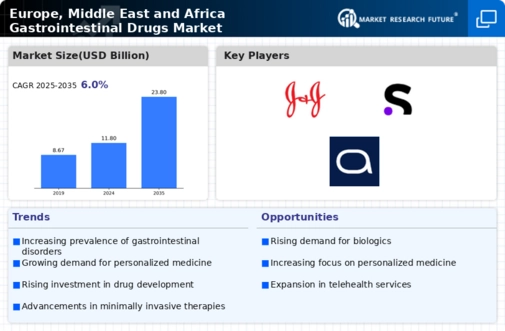Market Share
Europe Gastrointestinal Drugs Market Share Analysis
The market for gastrointestinal medications in Europe, the Middle East, and Africa (EMEA) is a vibrant and varied industry that serves a variety of digestive health concerns throughout the three continents. In this crucial area of the pharmaceutical sector, businesses compete for market share by positioning strategies. Market Segmentation: Different parameters, including medicine type, distribution channels, and region, are used to segment the market. Comprehending these categories is essential for businesses seeking to customize their approaches to certain geographic and population demands. Geographic Focus: Businesses frequently use a geocentric strategy, acknowledging the distinctive healthcare environments found in Africa, the Middle East, and Europe. Gaining a competitive edge involves adjusting medicine research, marketing, and distribution methods to the unique features of each location. Disease-Specific Approaches: Due to the wide range of gastrointestinal ailments, businesses frequently concentrate on certain illnesses within this group. For instance, businesses may carve out a niche and take a sizable portion of the market by focusing on common ailments like inflammatory bowel disease (IBD) and irritable bowel syndrome (IBS). Partnerships and Collaborations: Key to market positioning are strategic alliances with regional research centers, healthcare providers, and pharmaceutical corporations. These kinds of collaborations speed up regulatory clearances, streamline distribution routes, and improve comprehension of local demands. Regulatory Compliance: A sophisticated strategy is required to navigate the regulatory environment in EMEA nations. Profitable businesses place a high priority on regulatory compliance, making sure their medications adhere to the strict guidelines established by regulatory bodies in Europe, the Middle East, and Africa. Patient-Centric Marketing: It's critical to cultivate patient trust and brand loyalty. Businesses spend money on patient-centric marketing techniques that inform and involve customers while enhancing their perception of the business. This strategy works especially well in areas where patient participation in healthcare choices is important. E-commerce and Digital Platforms: The pharmaceutical sector has transformed due to the emergence of e-commerce and digital platforms. Businesses use Internet platforms to sell, market and even provide telemedicine services. This expands their customer base and makes gastrointestinal medications more accessible.






Leave a Comment